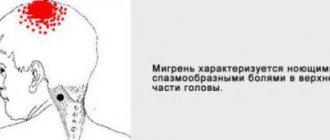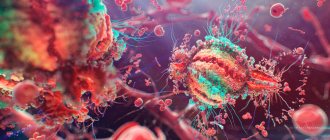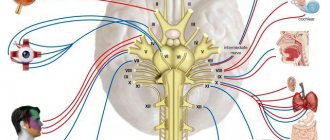An abnormal perception of the surrounding world and oneself, when everything seems unreal, and one’s own thoughts, emotions, sensations seem to be observed from the outside, is called depersonalization in psychiatry. Often it occurs along with derealization, characterized by the remoteness of everything around, the absence of colors in it, and memory impairment. Due to the similarity of symptoms, in the 10th revision of the International Classification of Diseases, depersonalization-derealization syndrome is designated by one code F 48.1.
Perception disorder affects more than 70% of people worldwide from time to time. It seems to them that their consciousness is divided into two parts and one of them, having lost control over their mind and body, panics, and the second indifferently watches this from the side. It's like a bad dream and therefore very frightening. A person sees everything in a fog, in muted colors, and cannot move either an arm or a leg. He feels extreme discomfort and feels like he is going crazy.
Experts do not consider this disorder a serious mental pathology. The human psyche can react this way to stress, fear, severe emotional shock, and even overwork in the physical sense. The brain “turns on” the defense, reducing a person’s sensory sensitivity and emotionality, so objects seem strange, unusual to the touch, and colors appear faded. That is, the perception of the world becomes unusual and strange, unfamiliar. This condition usually goes away on its own and quickly, without treatment.
But, if such a syndrome manifests itself frequently and lasts for a long time, and the symptoms intensify, then it is already dangerous: the individual can harm himself and others with his inappropriate behavior, or commit suicide. Therefore, in this case, the help of doctors is necessary.
You need to know that depersonalization can also accompany clinical depression, panic attacks, anxiety and bipolar disorders, and schizophrenia. Similar sensations are caused by narcotic drugs, sedatives and antihistamines and a number of other medications, as well as caffeine and alcohol.
"Covid fog"
“I suffered from coronavirus in a mild form, the temperature did not rise above 37.8 degrees,” says 35-year-old Natalya.
— At the beginning of the disease, the sensations were similar to the symptoms of a regular ARVI. But then something began to happen to your head: you seem to live in a fog. You don’t want to think about anything, do anything. It took me more than two months to get out of this state.” 44-year-old economist Alexey, who also recovered from coronavirus relatively easily, also complains of apathy: “I plunged into cat life for two weeks. You wake up, eat a little, then fall into a stupor and fall asleep without noticing. And so around the clock. You can’t remember anything in your head, you don’t remember any important things. Then it gradually began to pass, but I didn’t have the strength to engage in any intellectual activity for a long time.”
But 49-year-old Svetlana, who was hospitalized due to bilateral pneumonia, had to face other consequences. For three months after discharge, she suffered from insomnia and anxiety, and in the short intervals when she managed to fall asleep, she suffered from nightmares. As a result, the woman had to turn to a psychiatrist for help.
Photo © Pixabay
Experts drew attention to such consequences after the first wave of the pandemic. Today, according to researchers, more than a third of those who have recovered from coronavirus experience negative mental consequences to one degree or another. The range of disorders is very wide: from apathy to prolonged depression, panic attacks and memory problems. Doctors also discovered dependence: the more severe the illness, the more serious the psychological consequences.
“In general, it is very difficult to talk about any clear impact of coronavirus on the human psyche,” says Nikolai Starostin, a psychiatrist at a private St. Petersburg clinic. - For two reasons. Firstly, we still do not know exactly how the mechanism of the virus’s influence on the human mental apparatus works. There are already quite a lot of different studies, but they are still at the stage of discussion in the scientific community. We understand that this is clearly influenced by vascular damage: after all, they are the main target of the virus. But this knowledge is not yet enough to draw clear conclusions.”
Psychiatrists point out that the mental health problem associated with COVID-19 is much broader than just the effect of the virus on the human body. We can say that its effect on the human psyche begins much earlier than it enters the body.
Diagnostics
To identify a perceptual disorder, a thorough interview of the patient and his relatives is required - they will describe the patient’s behavior. Special testing is also carried out.
Blood tests and examination of the patient will not yield anything - he does not look sick, he has no chronic or hidden somatic diseases, his immunity is not satisfactory, and his physical condition is quite normal. But an MRI will show changes in certain areas of the brain. There are also special laboratory studies confirming changes in protein receptors and disturbances in the functioning of the endocrine gland - the pituitary gland.
Now there are clear criteria to confirm the diagnosis:
- Critical thinking of a patient who is aware of his problem.
- Maintaining clarity of consciousness, the absence of so-called twilight episodes, confusion of thought.
- Complaints that the mind exists separately from the body, the latter exists independently and its perception is impaired.
- A feeling of changing terrain, unreality, misrecognition of familiar objects.
The specialist should distinguish depersonalization from schizophrenia, which has similar symptoms. These pathologies are distinguished as follows: schizophrenia manifests itself with the same symptoms of the same intensity every day, and with a perceptual disorder they are much more varied.
Anxious expectations
Already in the first wave of the pandemic in 2021, psychiatrists drew attention to changes in the mental health of the population. Lockdowns, other coronavirus restrictions, remote work, a person constantly being at home - all this has already provoked negative psychological effects. Add to this anxious expectations - fear of becoming seriously ill, fear for loved ones, the possibility of losing a job - and here it is, a set that places a heavy burden on the human psyche.
At the same time, some researchers have started talking about the increase in suicidal and depressive feelings among completely healthy citizens in different countries of the world. Moreover, data began to appear about increasing cases of domestic violence and divorce.
Photo © Pixabay
When a person gets sick, his anxious expectations intensify. The patient begins to monitor his condition, symptoms, temperature, and breathing with fear. No one wants to end up in a hospital under strict quarantine. Even more fears are caused by the possibility of developing severe complications, the use of ventilators and other procedures. Now doctors already know that the most severe psychological consequences occur precisely in patients who have undergone artificial ventilation.
How does the virus work?
But the causes of post-Covid mental disorders are not only fears for one’s life. Here the actual factors of the disease begin to play a role. Lack of oxygen in the body also leads to poor supply to the brain. This effect can lead to a variety of consequences for the nervous system.
According to a study by Italian doctors published in the journal Brain, Behavior and Immunity, 55% of patients who recovered from Covid experienced some kind of mental problems. Scientists who surveyed 402 people associate them with hormonal imbalances, which are provoked by the immune system resisting the virus. Another reason for negative mental consequences is the severe stress that the patient’s body experiences.
A subsequent study of the psyche of patients who had COVID-19 corrected the data of Italian specialists. Thus, a group of researchers from the USA and Great Britain received less pessimistic results. After a large-scale study of the medical histories of more than 230 thousand people, scientists said that only 34% of Covid survivors complained of anxiety and personality disorder within six months.
How to diagnose?
The only and sure way to determine the cause of poor health is to consult a doctor. As a rule, the patient is referred for examinations:
- taking tests;
- X-ray, CT, MRI;
- consultation of specialized specialists.
The prescription of other measures depends on the severity and frequency of symptoms. In most cases, the diagnosed cause of pressure, wooliness and head fog is damage to the cervical vertebrae.
Covid as trauma
Specialists from the National Medical Research Center named after. V. M. Bekhterev believes that after COVID-19, patients experience symptoms characteristic of the so-called post-traumatic stress disorder (PTSD).
PTSD is a mental disorder that occurs after events that have a traumatic effect on the individual’s psyche. At the same time, the traumatic nature of the events that occurred is associated with a person’s feeling of helplessness, the inability to influence what is happening, and to resist danger. Characteristic symptoms of PTSD include flashbacks, nightmares, partial amnesia, emotional instability and panic attacks. These manifestations can occur not only immediately after a traumatic event, but also months and even years later.
PTSD is well known to psychiatrists - this disorder can occur after any event that traumatizes the individual’s psyche. And Covid may well be one of them.
Photo © Pixabay
"Side effect"
Another factor is the side effects of medications used to treat COVID-19. For example, glucocorticosteroids (GCS) are widely used in modern anti-Covid therapy. They are often prescribed in high doses and for a fairly long period. But at the same time, GCS can cause hallucinations, delusional states, depression and even manic-depressive states and paranoia. Taking other medications used in the treatment of Covid, for example, some antiviral drugs, also has a negative impact on the psyche.
Post-Covid syndrome?
The entire diverse set of consequences in people who have survived a new coronavirus infection has already been called “post-COVID-19 syndrome.” Among its symptoms are mental disorders that are already well known to us: “fog in the head,” disorientation in space, panic attacks and cognitive disorders. However, some researchers say that mental problems in Covid survivors are not unique consequences of the new disease, but complications that cause any severe infectious disease.
So, back in 2021, an article appeared in the authoritative medical journal The Lancet, which analyzed 72 studies of the consequences of epidemics - the predecessors of COVID-19 - SARS-1 and MERS viruses. Mental disorders in those who recovered from these infections turned out to be identical: confusion, depressed mood, anxiety, memory impairment, insomnia and even delirium. Thus, we can draw a preliminary conclusion: the COVID-19 virus does not necessarily have any unique properties that affect the psyche.
Photo © Pixabay
Symptoms
There are 3 conditional groups of signs characterizing depersonalization syndrome:
1. Emotional coldness, indifference in the perception of the surrounding world, detachment, indifference to people::
- indifference to the suffering of others;
- lack of joy when communicating with family and friends;
- insensitivity to music;
- loss of sense of humor;
- maintaining equanimity in situations that previously aroused any feelings, both negative and positive.
Fear is experienced only from the loss of control of one's body and loss of orientation in space. The feeling of confusion from not understanding the location, the history of getting here and further actions is depressing.
2. Violation of physical sensations:
- Loss of sensitivity to hot and cold;
- colors become dull, color blindness may appear;
- taste sensations change;
- objects seem blurry and have no boundaries;
- sounds seem muffled, as in water;
- There is no pain with minor wounds;
- coordination of movements is impaired;
- There is no feeling of hunger, and with it the appetite disappears.
3. Mental immunity:
- a person forgets his preferences - what he likes and dislikes;
- lack of incentives and motives - reluctance to take care of yourself, cook food, do laundry, work, go shopping;
- temporary disorientation - an individual can sit without doing anything for several hours and not understand how much time has passed;
- the feeling of participating as an actor in a boring, drawn-out play;
- contemplation from the outside of your life, as if it were a dream.
The main sign of a perception disorder is a person’s deep self-absorption. At first he realizes that he perceives his personality incorrectly, this depresses him and causes strong emotional disturbance.
When trying to understand what is happening, the feeling of unreality becomes stronger, and the absurdity of the situation forces the individual to avoid communication with other people. The individual, however, is aware of the painfulness of his condition.
In general, the clinical picture of depersonalization can be described as follows:
- The perception of the world is disrupted - it seems unreal, fantastic.
- Complete detachment from what is happening around.
- Loss of satisfaction from natural physiological needs - sleep, food, defects, sex, etc.
- Closedness.
- Impaired perception of the structure of one's body - arms and legs seem artificial, of unknown configuration or size.
- Inability to control your body.
- Decreased intellectual abilities.
- Feeling of loneliness, abandoned by everyone.
- Absence of any emotional manifestations.
- Changes in physiological sensations.
- Split personality.
- The feeling of watching yourself from the outside.
These symptoms of perceptual disorder may have varying degrees of severity for different types of depersonalization, which will be discussed below.









